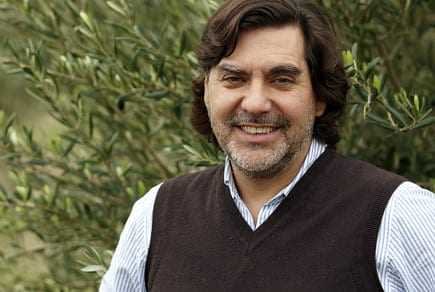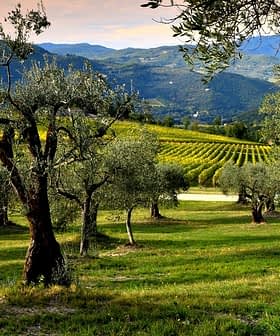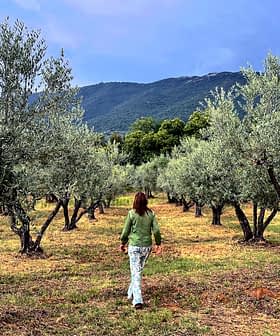Mark Kailis, managing director of Kailis Organic Olive Groves in Western Australia is raising AU$30 million (about US$26 million) to buy the olive grove and production assets of the failed Australian agribusiness Great Southern in a bid to become an organic olive oil producer on a global scale. The purchase would add nearly 1800 hectares, or about 4500 acres, to the existing holdings of Kailis Organic.
We approach a critical moment in our evolution in this relationship with the olive tree.
He is the son of Peter Kailis, the founder of the huge Red Rooster restaurant chain, and the grandson of George Peter Kailis, who began a Perth seafood business in 1917 that would be the beginning of a family business empire. Mark Kailis has nearly two decades of agribusiness management experience including wine making.
See Also:Chinese Investors Purchase Australia’s Kailis Organic
Kailis Organic has been in the premium extra virgin olive oil market for about nine years selling their “Premium Blends” of Frantoio (50%), Leccino (25%) and Coratina (25%) varieties, as well as organic extra virgin olive oils infused with blood orange and lime. Last year the company sold 160,000 liters of extra virgin olive oil of which 57% was organic. About two-thirds of last year’s sales were for Kailis Organic branded products, with the remainder sold into the bulk commodities market.
“There has been awareness about the size of the organic industry and historical growth as a target for future growth,” Kailis told the Olive Oil Times, when asked how receptive institutional investors have been to his ambitions to ramp up to an organic olive oil mega-producer. “With the question of sustainability and carbon footprint, organic olive groves have an advantage by not using fossil fuel fertilizers and utilizing carbon sequention carbon management practices such as cover-cropping. From this perspective, institutional funds understand the benefits organic has over conventional farming and marketing.”
Although Kailis Organic has been catering to the high-end, it’s the middle market that Kailis has his sights on. “Our current stockists predominantly represent a market for our Premium Range,” said Kailis, “a range which has been in the Australian market place for almost 10 years, positioned to the specialty retail sector, and internationally in 7 countries including Germany, Asia and the UK.”
At a time when worldwide olive oil prices are critically low, Kailis knows he has his work cut out for him. “With the crisis that’s existed in the last you know two years in the world, there has seen commodity prices drop just about everywhere” he told the Finance News Network. “Olive oil hasn’t been any different; it has suffered commodity loss in conventional olive oil. In organic olive oil, certainly in the organic sector, there has been a drop.”
Still, Kailis expects with the acquisition to increase efficiencies necessary to compete at a time when global commodities are under extreme price pressures. “With increased production comes increased economies of scale. The Premium Range will undergo product extension and re-launch, competitively positioned and attractive to more markets both domestic and international,” he told us.
Kailis Organic markets and sells its organic EVOO under brands including Kailis Organic Premium Range, Chef’s Blend and Splish.
Splish, a product specially designed to give Kailis Organic a position in the mass-supermarket sector, is also targeted towards growing the company’s export sales. The innovative tetra pak provide competitive advantage due to its quality, organic status and minimal environmental impact.
We asked Kailis about his company’s innovative approach to packaging. “Kailis Organics Premium Range is packaged in glass bottles. Splish is packaged in a 100% recyclable tetra pak using the innovative, specially designed Prisma system for olive oil.”
“The tactility and the gorgeous nature of glass will always have a place in the market, it is tradition and it is what look people expect, however, Kailis Organic believes being organic is not enough, at the core is a desire to contribute to a better planet. This means focusing on packaging and supply chain design and methodologies so the organization’s environmental responsibility is total and not just about good farming and manufacturing processes.”
Kailis Organic continues to expand into the food service sector with its volume product Chef’s Blend and intends launching second-tier products in the near future to further diversify and compete in what Kailis calls “an exciting and dynamic environment.”
With high-density olive farms sprouting up from Chile to China, the Great Southern acreage is surprisingly, well, low-density. Kailis told us his Dandaragan property which represents around 18% of the total grove area has planting densities of 555 which is considered to be high density. “As for the balance of our properties, densities are 333 per hectare consistent with non-high density grove set-ups.”
Despite growing up in an Australian family dynasty of sorts, Mark Kailis doesn’t seem to mind rolling up his shirt sleeves and he told us he enjoys the olive oil biz. “The olive oil business is a pure expression of terroir with little interference from man – in other words, the quality of our end product is produced in the olive groves with the interaction of processing representing a simple but critical aspect to the final product, for this I have a sense of purity of product that can be expressed in different years the effects of good farm management and mother nature.”
Kailis had this thought as we left him to get back to his raising of $30M:
“After 7,500 years of production of olive oil world-wide, we approach a critical moment in our evolution in this relationship with the olive tree. Critical in the sense that the world other than traditional countries is rapidly becoming more educated about quality aspects of good extra virgin olive oil. The necessity and the growth that will occur in the next 20 years will be a direct result of this education and communication tools such as Olive Oil Times. Higher demand will be placed on sellers to ensure what is stated as ‘EVOO’ – actually is both extra virgin and from an olive tree. This pressure is where demand in high-quality fresh, legitimate EVOO will come from and both the old world and new world productions must become aligned with this message.”









